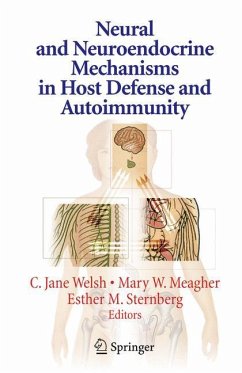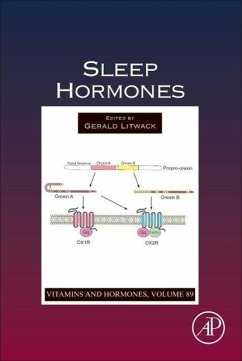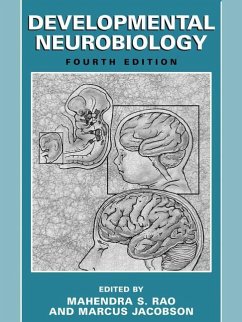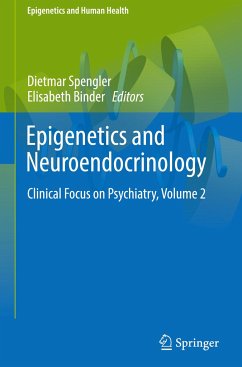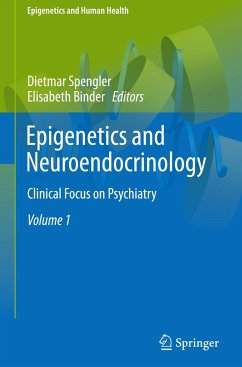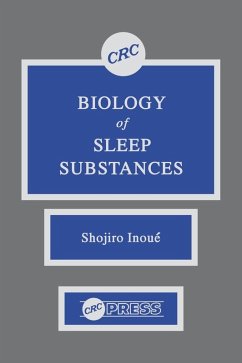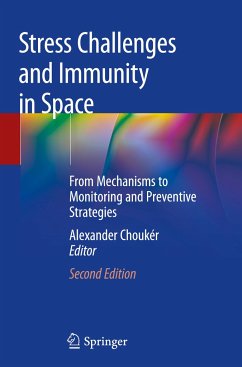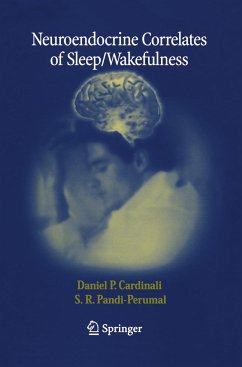
Neuroendocrine Correlates of Sleep/Wakefulness
Versandkostenfrei!
Versandfertig in 6-10 Tagen
151,99 €
inkl. MwSt.

PAYBACK Punkte
76 °P sammeln!
As the title suggests, and unlike other existing books on sleep medicine, Neuroendocrine Correlates of Sleep/Wakefulness will be devoted primarily to endocrine regulation of the behavioral state control. It will address a wide spectrum of sleep./wakefulness phenomena (both animals and humans), including pathogenesis, diagnosis, and management.From molecular biology to applied clinical therapy, sleep research has been transformed in the last few years from a research backwater to an important interdisciplinary field.Anyone who regularly reads the literature on sleep, biological rhythms, or neur...
As the title suggests, and unlike other existing books on sleep medicine, Neuroendocrine Correlates of Sleep/Wakefulness will be devoted primarily to endocrine regulation of the behavioral state control. It will address a wide spectrum of sleep./wakefulness phenomena (both animals and humans), including pathogenesis, diagnosis, and management.
From molecular biology to applied clinical therapy, sleep research has been transformed in the last few years from a research backwater to an important interdisciplinary field.
Anyone who regularly reads the literature on sleep, biological rhythms, or neuroendocrinology is aware that one of the subspecialties within sleep medicine, the neuroendocrine correlates of sleep/wakefulness, has in particular experienced a growth rate that is even faster than that of the field as a whole. To a significant extent this has been due to the introduction of new research technologies.
The widespread adoption of a range of new methods in sleep research has opened a window into activities at the cellular and molecular level, which previously had been tightly closed. Consequently these activities are being characterized with a degree of precision and sensitivity that is without precedent. This volume invites the reader to explore the new vistas that have been opened onto the neuroendocrine frontier of sleep medicine. The editors have selectively identified a number of key articles having a citation frequency, which is considerably above the norm or which otherwise have contributed importantly to defining the neuroendocrine perspective.
This new volume on Neuroendocrine Correlates of Sleep/Wakefulness is an up-to-date resource of research summaries and reviews written by major contributors to the fields of sleep, biological rhythms and neuroendocrinology. Its coverage is broad and its basic
and clinical science reviews are detailed.
In this volume,an international team of experts discuss their latest ideas, concepts, methods, and interpretations with supporting examples. This volume is intended for advanced students and specialists in psychobiology, neuroscience, neuroendocrinology, and psychiatry but might also be interest to anyone concerned with understanding the Neuroendocrine correlates of sleep/wakefulness.
The contributions are directed more towards providing an integrated view of the field from the perspective of the authors, rather than being a compendium of recent results. The intent is to provide a reference book for recent and future workers in this and related areas of medicine and biology. Each topic in this volume has received the attention of a panel of authors who have responded to our request to review and place into perspective the major issues, which will undoubtedly confront newcomers to the field.
The topics dealt with in Neuroendocrine correlates of Sleep/wakefulness are both diverse and complex. The editors hope that this volume will provide an authoritative summary of important issues in the neuroendocrine correlates of sleep/wakefulness. We also hope that it will motivate new researchers to join the quest for solutions to the problems that have been identified by our contributing authors.
From molecular biology to applied clinical therapy, sleep research has been transformed in the last few years from a research backwater to an important interdisciplinary field.
Anyone who regularly reads the literature on sleep, biological rhythms, or neuroendocrinology is aware that one of the subspecialties within sleep medicine, the neuroendocrine correlates of sleep/wakefulness, has in particular experienced a growth rate that is even faster than that of the field as a whole. To a significant extent this has been due to the introduction of new research technologies.
The widespread adoption of a range of new methods in sleep research has opened a window into activities at the cellular and molecular level, which previously had been tightly closed. Consequently these activities are being characterized with a degree of precision and sensitivity that is without precedent. This volume invites the reader to explore the new vistas that have been opened onto the neuroendocrine frontier of sleep medicine. The editors have selectively identified a number of key articles having a citation frequency, which is considerably above the norm or which otherwise have contributed importantly to defining the neuroendocrine perspective.
This new volume on Neuroendocrine Correlates of Sleep/Wakefulness is an up-to-date resource of research summaries and reviews written by major contributors to the fields of sleep, biological rhythms and neuroendocrinology. Its coverage is broad and its basic
and clinical science reviews are detailed.
In this volume,an international team of experts discuss their latest ideas, concepts, methods, and interpretations with supporting examples. This volume is intended for advanced students and specialists in psychobiology, neuroscience, neuroendocrinology, and psychiatry but might also be interest to anyone concerned with understanding the Neuroendocrine correlates of sleep/wakefulness.
The contributions are directed more towards providing an integrated view of the field from the perspective of the authors, rather than being a compendium of recent results. The intent is to provide a reference book for recent and future workers in this and related areas of medicine and biology. Each topic in this volume has received the attention of a panel of authors who have responded to our request to review and place into perspective the major issues, which will undoubtedly confront newcomers to the field.
The topics dealt with in Neuroendocrine correlates of Sleep/wakefulness are both diverse and complex. The editors hope that this volume will provide an authoritative summary of important issues in the neuroendocrine correlates of sleep/wakefulness. We also hope that it will motivate new researchers to join the quest for solutions to the problems that have been identified by our contributing authors.





